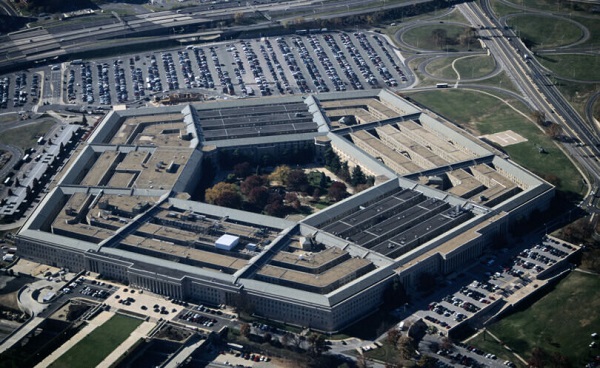Alberta
Working to avoid future US tariffs, Alberta signs onto U.S. energy pact

Louisiana Governor Jeff Landry and New Hampshire Governor Chris Sununu of the Governors’ Coalition for Energy Security
Premier Danielle Smith has joined the Governors’ Coalition for Energy Security to further support advocacy of Alberta’s energy and environmental interests with key U.S. states.
The coalition was established in September 2024 by U.S. State governors Jeff Landry (Louisiana) and Chris Sununu (New Hampshire) with the aim of ensuring energy security, lower energy costs, increased reliability, sustainable economic development and sensible management of energy resources and the environment. With 12 U.S. states already signatories to the coalition, Alberta is the first non-U.S. state to enter into this agreement.
By expanding energy ties with the U.S. and promoting cross-border energy trade and participation, Alberta is helping to build upon its North American Energy strategy. Alberta already accounts for 56 per cent of all oil imports to the U.S. – twice as much as Mexico, Saudi Arabia and Iraq combined – which is helping to drive job creation and prosperity on both sides of the border. Natural gas also plays an important role in North America’s energy mix. Alberta is the largest producer of natural gas in Canada and remains positioned to support the U.S. in filling their domestic supply gaps.
“I am honoured to join the Governors’ Coalition for Energy Security and would like to extend my sincere thanks to governors Landry and Sununu for the invitation. Alberta plays a vital role in North American energy security, serving as the largest supplier of crude oil and natural gas to the United States. With 200 billion barrels of recoverable oil, 200 trillion cubic feet of recoverable natural gas, significant natural gas liquids and ample pore space for carbon capture, Alberta’s contribution is set to grow even further as we look to work with the Trump Administration and other U.S. partners to increase our pipeline capacity to our greatest friend and ally, the United States. We are proud to collaborate with this coalition of allied states in advancing energy security, reliability and affordability for Americans and Canadians.”
“Our mission as an organization has not changed but Alberta’s welcome arrival to our group sparked a conversation about what our core mission is, and that is ensuring energy security in all its forms. Our members all share the common goal of enhancing and protecting energy options for our people and businesses, which leads to lower energy costs, increased reliability, sustainable economic development and wise management of energy resources and the environment. I welcome Premier Smith and the insights she will bring as the leader from a fellow energy-producing province, that like my state, is under a federal system of government where national imperatives are not always aligned with state or provincial interests.”
Alberta is a global leader in emissions reduction technology and clean energy solutions. The province has captured about 14 million tonnes of carbon dioxide through carbon capture, utilization and storage technology, and has the ability to support the U.S. in developing new infrastructure and supply chains for future energy markets in the areas of hydrogen, renewables, small modular reactors and others.
Alberta is also unlocking its untapped geological potential to help meet the increasing demand for minerals – many of which are used worldwide to manufacture batteries, cell phones, energy storage cells and other products. This includes the province’s lithium sector where Alberta’s government is supporting several innovative projects to develop new ways to extract and concentrate lithium faster and with higher recovery rates that are less capital and energy intensive and have a smaller land-use footprint.
As part of this coalition, Alberta looks forward to sharing best practices with states that already have expertise in these areas.
Quick facts
- The U.S. is Alberta’s largest trading partner, with C$188 billion in bilateral trade in 2023.
- In 2023, energy products accounted for approximately C$133.6 billion, or more than 80 per cent of Alberta’s exports to the U.S.
- The Governors’ Coalition for Energy Security’s 12 signatory states include Louisiana, New Hampshire, Indiana (Governor Eric Holcomb), Alabama (Governor Kay Ivey), Georgia (Governor Brian Kemp), Tennessee (Governor Bill Lee), South Dakota (Governor Kristi Noem), Mississippi (Governor Tate Reeves), Arkansas (Governor Sarah Huckabee Sanders), Oklahoma (Governor Kevin Stitt), Wyoming (Governor Mark Gordon) and Virginia (Governor Glenn Youngkin).
Alberta
Alberta Premier Danielle Smith Discusses Moving Energy Forward at the Global Energy Show in Calgary

From Energy Now
At the energy conference in Calgary, Alberta Premier Danielle Smith pressed the case for building infrastructure to move provincial products to international markets, via a transportation and energy corridor to British Columbia.
“The anchor tenant for this corridor must be a 42-inch pipeline, moving one million incremental barrels of oil to those global markets. And we can’t stop there,” she told the audience.
The premier reiterated her support for new pipelines north to Grays Bay in Nunavut, east to Churchill, Man., and potentially a new version of Energy East.
The discussion comes as Prime Minister Mark Carney and his government are assembling a list of major projects of national interest to fast-track for approval.
Carney has also pledged to establish a major project review office that would issue decisions within two years, instead of five.
Alberta
Punishing Alberta Oil Production: The Divisive Effect of Policies For Carney’s “Decarbonized Oil”

From Energy Now
By Ron Wallace
The federal government has doubled down on its commitment to “responsibly produced oil and gas”. These terms are apparently carefully crafted to maintain federal policies for Net Zero. These policies include a Canadian emissions cap, tanker bans and a clean electricity mandate.
Following meetings in Saskatoon in early June between Prime Minister Mark Carney and Canadian provincial and territorial leaders, the federal government expressed renewed interest in the completion of new oil pipelines to reduce reliance on oil exports to the USA while providing better access to foreign markets. However Carney, while suggesting that there is “real potential” for such projects nonetheless qualified that support as being limited to projects that would “decarbonize” Canadian oil, apparently those that would employ carbon capture technologies. While the meeting did not result in a final list of potential projects, Alberta Premier Danielle Smith said that this approach would constitute a “grand bargain” whereby new pipelines to increase oil exports could help fund decarbonization efforts. But is that true and what are the implications for the Albertan and Canadian economies?
The federal government has doubled down on its commitment to “responsibly produced oil and gas”. These terms are apparently carefully crafted to maintain federal policies for Net Zero. These policies include a Canadian emissions cap, tanker bans and a clean electricity mandate. Many would consider that Canadians, especially Albertans, should be wary of these largely undefined announcements in which Ottawa proposes solely to determine projects that are “in the national interest.”
The federal government has tabled legislation designed to address these challenges with Bill C-5: An Act to enact the Free Trade and Labour Mobility Act and the Building Canada Act (the One Canadian Economy Act). Rather than replacing controversial, and challenged, legislation like the Impact Assessment Act, the Carney government proposes to add more legislation designed to accelerate and streamline regulatory approvals for energy and infrastructure projects. However, only those projects that Ottawa designates as being in the national interest would be approved. While clearer, shorter regulatory timelines and the restoration of the Major Projects Office are also proposed, Bill C-5 is to be superimposed over a crippling regulatory base.
It remains to be seen if this attempt will restore a much-diminished Canadian Can-Do spirit for economic development by encouraging much-needed, indeed essential interprovincial teamwork across shared jurisdictions. While the Act’s proposed single approval process could provide for expedited review timelines, a complex web of regulatory processes will remain in place requiring much enhanced interagency and interprovincial coordination. Given Canada’s much-diminished record for regulatory and policy clarity will this legislation be enough to persuade the corporate and international capital community to consider Canada as a prime investment destination?
As with all complex matters the devil always lurks in the details. Notably, these federal initiatives arrive at a time when the Carney government is facing ever-more pressing geopolitical, energy security and economic concerns. The Organization for Economic Co-operation and Development predicts that Canada’s economy will grow by a dismal one per cent in 2025 and 1.1 per cent in 2026 – this at a time when the global economy is predicted to grow by 2.9 per cent.
It should come as no surprise that Carney’s recent musing about the “real potential” for decarbonized oil pipelines have sparked debate. The undefined term “decarbonized”, is clearly aimed directly at western Canadian oil production as part of Ottawa’s broader strategy to achieve national emissions commitments using costly carbon capture and storage (CCS) projects whose economic viability at scale has been questioned. What might this mean for western Canadian oil producers?
The Alberta Oil sands presently account for about 58% of Canada’s total oil output. Data from December 2023 show Alberta producing a record 4.53 million barrels per day (MMb/d) as major oil export pipelines including Trans Mountain, Keystone and the Enbridge Mainline operate at high levels of capacity. Meanwhile, in 2023 eastern Canada imported on average about 490,000 barrels of crude oil per day (bpd) at a cost estimated at CAD $19.5 billion. These seaborne shipments to major refineries (like New Brunswick’s Irving Refinery in Saint John) rely on imported oil by tanker with crude oil deliveries to New Brunswick averaging around 263,000 barrels per day. In 2023 the estimated total cost to Canada for imported crude oil was $19.5 billion with oil imports arriving from the United States (72.4%), Nigeria (12.9%), and Saudi Arabia (10.7%). Since 1988, marine terminals along the St. Lawrence have seen imports of foreign oil valued at more than $228 billion while the Irving Oil refinery imported $136 billion from 1988 to 2020.
What are the policy and cost implication of Carney’s call for the “decarbonization” of western Canadian produced, oil? It implies that western Canadian “decarbonized” oil would have to be produced and transported to competitive world markets under a material regulatory and financial burden. Meanwhile, eastern Canadian refiners would be allowed to import oil from the USA and offshore jurisdictions free from any comparable regulatory burdens. This policy would penalize, and makes less competitive, Canadian producers while rewarding offshore sources. A federal regulatory requirement to decarbonize western Canadian crude oil production without imposing similar restrictions on imported oil would render the One Canadian Economy Act moot and create two market realities in Canada – one that favours imports and that discourages, or at very least threatens the competitiveness of, Canadian oil export production.
Ron Wallace is a former Member of the National Energy Board.
-

 National2 days ago
National2 days agoCarney promotes MP instrumental in freezing Freedom Convoy donors’ bank accounts
-

 conflict1 day ago
conflict1 day agoIran nuclear talks were ‘coordinated deception’ between US and Israel: report
-

 illegal immigration2 days ago
illegal immigration2 days agoLA protests continue as judge pulls back CA National Guard ahead of ‘No Kings Day’
-

 conflict2 days ago
conflict2 days agoIsrael strikes Iran, targeting nuclear sites; U.S. not involved in attack
-

 International1 day ago
International1 day agoIsrael’s Decapitation Strike on Iran Reverberates Across Global Flashpoints
-

 Energy1 day ago
Energy1 day agoCanada is no energy superpower
-

 Alberta1 day ago
Alberta1 day agoPunishing Alberta Oil Production: The Divisive Effect of Policies For Carney’s “Decarbonized Oil”
-

 International2 days ago
International2 days agoPentagon agency to simulate lockdowns, mass vaccinations, public compliance messaging



